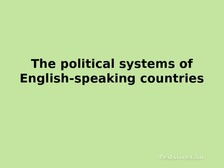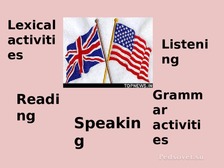the political systems of english-speaking countries 10 класс
Муниципальное общеобразовательное учреждение
средняя общеобразовательная школа №7
города Алексеевки Белгородской области
Открытый урок
« The political systems of English-speaking countries »
Подготовил:
учитель английского языка
Левченко М.А.
Класс: 10
2012
Тип занятия: комбинированный урок
Цели:
Совершенствование навыков аудирования и умение отвечать на вопросы по содержанию изученного материала на английском языке.
Развитие речевых умений.
Развитие умение запрашивать информацию с помощью вопросов.
Развитие способности к осмысленности восприятия и развитие способности к сравнению и сопоставлению фактов
Повторение, обобщение и систематизация знаний учащихся по данной теме.
Воспитание всесторонне развитой личности
Формирование политического мировоззрения
Оснащение урока: мультимедийное оборудование, раздаточный материал
Introduction
Phonetic exercises
/t/ – state, system, political system, minister, cabinet, constitution, parliament, government, senate;
/r/ – prime, the prime-minister, majority, problem, rule, represent, responsible, democracy, democratic, congress, administration, secretary, president, vice-president;
/w/ – work, power, branch of power.
According to phonetic exercises students title the topic of the lesson, set a goal and frame a plan of it. (слайд1 )
Lexical activities
Add one word to make a word combination. (слайд 2 )
To appoint … To delay … To revise … To examine …
To sign … To rule … To make … To give …
To veto … To impeach … To elect…
Grammar activities
Open the brackets, using Passive Voice and write the name of the country. (слайд 3 )
The Prime-Minister ( appoint) by the Queen
The members of the House of Commons ( elect) by the people
The President (elect) directly by the people
The reputation of the Monarchy (spoil) by the royals
The Administration (approve) by the Congress
Judges (appoint ) by the President
Reading for specific information
Read texts and complete the table. (слайд 4 )
Political System of the USA
Washington, the capital of the United States, is situated on the Potomac River in the District of Columbia. The district is a piece of land which doesn't belong to any state but to all the states. Under the Constitution, the federal government is divided into three branches. The legislative power is vested in Congress and made up of two houses: the Senate and the House of Representatives. There are 435 members in the House of Representatives and 100 senators. Each state elects two members of the 100-member Senate.
The executive branch is headed by the President, who proposes bills to Congress, enforces federal laws, serves as commander-in-chief of the Armed Forces and with the approval of the Senate, makes treaties. President can veto a bill unless Congress by a two-thirds vote shall overrule him.
The vice President, elected from the same political party as the President, acts as chairman of the Senate, and in the event of the death of the President assumes the Presidency. The judicial branch is made up of Federal District Courts, 11 Federal Courts and the Supreme Court. Federal judges are appointed by the President for life. Federal courts decide cases involving federal law, conflicts between citizens of different states. The Supreme Court may rule the law to be unconstitutional.
Now about the elections. The President is chosen in nation-wide elections every 4 years together with the Vice-President. Constitution has been amended 26 times. The Bill of Rights guarantees individual liberties: freedom of speech, religion and so on. Later amendments abolished slavery, granted the right to vote to women and allowed citizens to vote at age 18.
Political System of Great Britain
The United Kingdom of Great Britain and Northern Ireland is a constitutional monarchy. It means that the sovereign reigns but does not rule. Britain does not have a written constitution, but a set of laws.
Parliament is the most important authority in Britain. Technically Parliament is made up of three parts: the Monarch, the House of Lords; and the House of Commons. In reality the House of Commons is the only one of the three which has true power. The monarch serves formally as head of state. But the monarch is expected to be politically neutral and should not make political decisions.
The House of Commons consists of Members of Parliament. There are 650 of them in the House of Commons. They are elected by secret ballot. General elections are held every five years. The country is divided into 650 constituencies. All citizens, aged 18 have the right to vote.
Each political party puts up one candidate for each constituency. The one who wins the most votes is elected MP for that area.
The party which wins the most seats in Parliament forms the Government. Its leader becomes the Prime Minister. His first job is to choose his Cabinet. The Prime Minister usually takes policy decisions with the agreement of the Cabinet. The functions of the House of Commons are legislation and scrutiny of government activities. The House of Commons is presided over by the Speaker. The Speaker is appointed by the Government.
The House of Lords comprises about 1,200 peers. It is presided by the Lord Chancellor. The House of Lords has no real power. It acts rather as an advisory council.
It's in the House of Commons that new bills are introduced and debated. If the majority of the members are in favour of a bill, it goes to the House of Lords to be debated. The House of Lords has the right to reject a new bill twice.
But after two rejections they are obliged to accept it. And finally a bill goes to the monarch to be signed. Only then it becomes law.
Parliament is responsible for British national policy. Local governments are responsible for organizing of education, police and many others.
|
Country |
Head of state |
branches |
Institutions of power / Officials |
Functions |
|
|
|
|
|
|
|
|
|
|
||
|
|
|
|
||
|
|
|
|
|
|
|
|
|
|
||
|
|
|
|
Recreation
(Students listen to music, after listening they complete the sentence: This music makes me think of…) (слайд 5 )
Speaking
(Students work in groups)
Questions to “English students”
Who is the Head of state in Britain?
How many ministers are there in the Cabinet?
Who chooses Cabinet Ministers?
How many houses does Parliament consist of? What are they?
Who is in the House of Commons?
Who elects them?
Who forms the House of Lords?
Who appoints peers?
Questions to “American students”
Which institutions represent the legislative and executive brunches?
Who veto laws?
What are the functions of Congress?
Who elects the President?
What is the main document of the USA?
How many members are there in the House of Representatives?
Who is the head of the executive power in the USA?
How often do the President's elections take place?
(Individual tasks)
Quiz:
What does the British Parliament consist of?
a) Houses
b) palaces
c) Castles
d) rooms
2. How many main political parties are there in Great Britain?
a) two
b) three
c) four
d) one
3. The British national flag is called:
a) King Phillip
b) cross and stripes
b) St. Andrew
c) Union Jack
4. What is the official residence of the British Prime Minister?
a) Downing Street, 10
b) Downing Street,5
c) Baker Street, 5
c) Wall Street? 10
5. Great Britain is:
a) a constitutional monarchy
b) a democracy
Students make up projects and present them. (слайд 6 )
The conclusion of the lesson: Relaxation. Marks. Homework.
На странице приведен фрагмент.
|
Автор: Левченко Марина Александровна
→ Marishka6016 |
Спасибо за Вашу оценку. Если хотите, чтобы Ваше имя
стало известно автору, войдите на сайт как пользователь
и нажмите Спасибо еще раз. Ваше имя появится на этой стрнице.


